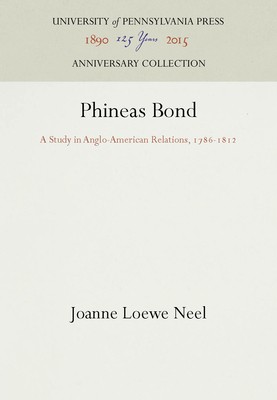
- We will send in 10–14 business days.
- Author: Joanne Loewe Neel
- Publisher: University of Pennsylvania Press Anniversary Collection
- Year: 1968
- Pages: 224
- ISBN-10: 1512804819
- ISBN-13: 9781512804812
- Format: 15.6 x 23.4 x 1.3 cm, hardcover
- Language: English
- SAVE -10% with code: EXTRA
Reviews
Description
Seven years of war forced a reluctant mother country to recognize the independence of the thirteen American colonies. With the signing of the treaty at Paris on the 3rd of September 1783, the rebellion came to a formal end, and a new state entered the family of nations. But the resulting peace stopped short of men's minds and spirits. There was no binding up of wounds nor forgetting of past injuries.
On the contrary, hatred persisted and, if anything, intensified. On both sides of the Atlantic a nurturing of grievances, of suspicions, and of jealousies continued. For over thirty years Britons and Americans viewed one another with a jaundiced eye until a second peace treaty--this time at Ghent in 1814--brought to a formal close a second Anglo-American war. In the midst of this long, drawn-out conflict moved Phineas Bond, Esq. He reached the age of reason in Philadelphia before the outbreak of the War for Independence and was politically active in Pennsylvania from the beginning of what he called, the Time of Troubles. He played a role as an American Tory, albeit a brief one, in the Revolution itself and with thousands of other Loyalists sought asylum in England. During a seemingly endless exile he became one of the most trusted attorneys of those British merchants in the Atlantic trade to whom Americans owed vast sums of money. Three years after the Peace of Paris, Bond returned to Philadelphia as His Britannic Majesty's consul to the middle states and as a representative of the merchants. There he remained, serving king and traders, until the eve of the War of 1812. Although occupying comparatively minor posts, Bond became a microcosm of his time. His thoughts and work, his dreams and hopes, his experiences and convictions point up the era between the two wars for American independence.EXTRA 10 % discount with code: EXTRA
The promotion ends in 18d.10:57:17
The discount code is valid when purchasing from 10 €. Discounts do not stack.
- Author: Joanne Loewe Neel
- Publisher: University of Pennsylvania Press Anniversary Collection
- Year: 1968
- Pages: 224
- ISBN-10: 1512804819
- ISBN-13: 9781512804812
- Format: 15.6 x 23.4 x 1.3 cm, hardcover
- Language: English English
Seven years of war forced a reluctant mother country to recognize the independence of the thirteen American colonies. With the signing of the treaty at Paris on the 3rd of September 1783, the rebellion came to a formal end, and a new state entered the family of nations. But the resulting peace stopped short of men's minds and spirits. There was no binding up of wounds nor forgetting of past injuries.
On the contrary, hatred persisted and, if anything, intensified. On both sides of the Atlantic a nurturing of grievances, of suspicions, and of jealousies continued. For over thirty years Britons and Americans viewed one another with a jaundiced eye until a second peace treaty--this time at Ghent in 1814--brought to a formal close a second Anglo-American war. In the midst of this long, drawn-out conflict moved Phineas Bond, Esq. He reached the age of reason in Philadelphia before the outbreak of the War for Independence and was politically active in Pennsylvania from the beginning of what he called, the Time of Troubles. He played a role as an American Tory, albeit a brief one, in the Revolution itself and with thousands of other Loyalists sought asylum in England. During a seemingly endless exile he became one of the most trusted attorneys of those British merchants in the Atlantic trade to whom Americans owed vast sums of money. Three years after the Peace of Paris, Bond returned to Philadelphia as His Britannic Majesty's consul to the middle states and as a representative of the merchants. There he remained, serving king and traders, until the eve of the War of 1812. Although occupying comparatively minor posts, Bond became a microcosm of his time. His thoughts and work, his dreams and hopes, his experiences and convictions point up the era between the two wars for American independence.

Reviews